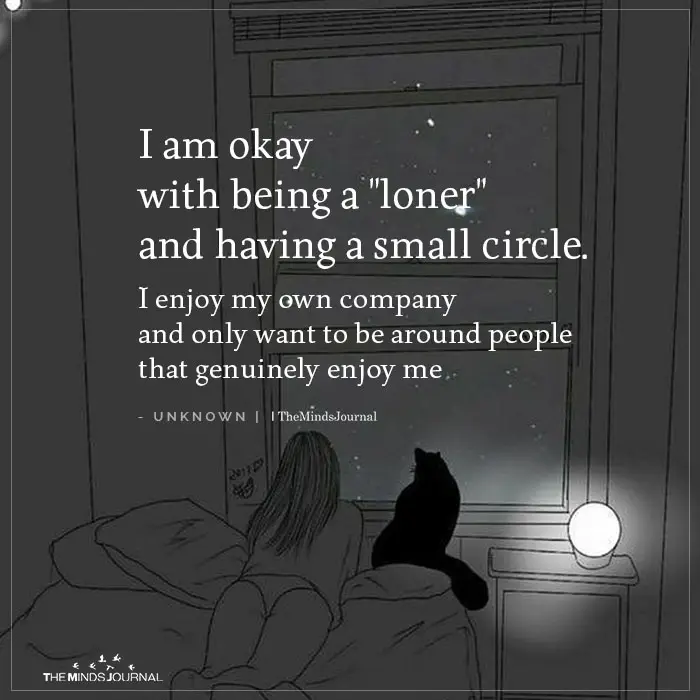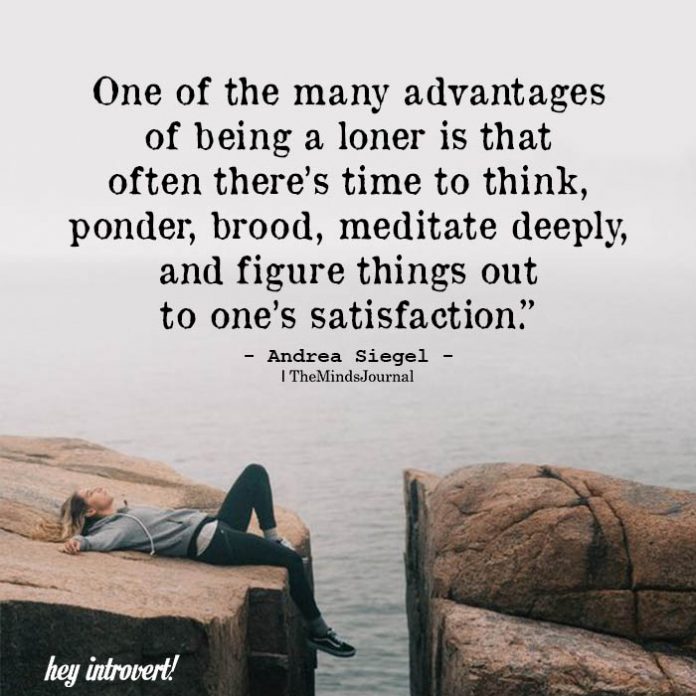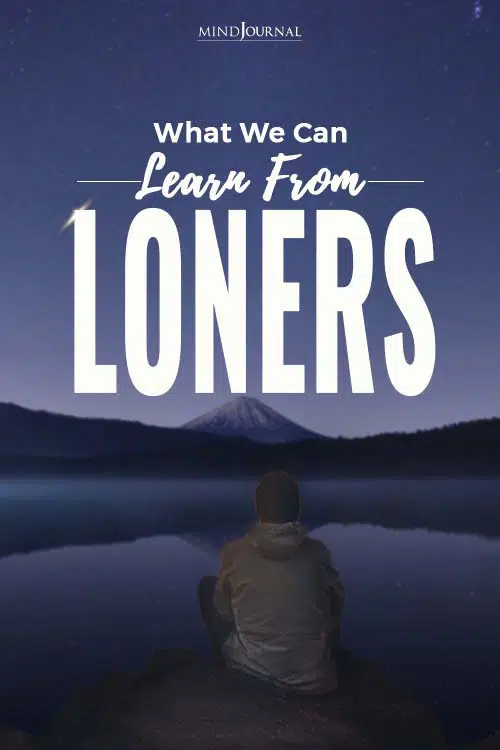Loners who are perfectly fine being alone, and do not always find the need to rely on others for some company are some of the most mature and intelligent people you will come across, and there is so much we can learn from them. But before you go any further, it is crucial that you understand the difference between loneliness and solitude, and what all you can learn from loners.
Loneliness is a complex and unpleasant emotional response to isolation or lack of companionship. The pain of loneliness is such that, throughout history, solitary confinement has been used as a form of torture and punishment.
More than just painful, loneliness is also damaging. Lonely people eat and drink more and exercise and sleep less. They are at higher risk of developing psychological problems, such as depression, psychosis, and addiction, as well as physical problems, such as infection, cancer, and cardiovascular disease.
Loneliness is a particular problem of modernity. One U.S. study found that between 1985 and 2004, the proportion of people reporting having no one to confide in almost tripled. According to a poll carried out in 2017 for the Jo Cox Commission on Loneliness, three-quarters of older people in the U.K. are lonely. Shockingly, two-fifths of respondents agreed with the statement, “sometimes an entire day goes by, and I haven’t spoken to anybody.”
Some of the factors behind these stark statistics include smaller household sizes, greater migration, rising self-employment, higher media consumption, and longer life expectancy. Large conglomerations built on productivity and consumption at the expense of connection and contemplation can feel profoundly alienating.
Related: 8 Advantages Of Life As A Loner
The Internet has become the great comforter and seems to offer it all: news, knowledge, music, entertainment, shopping, relationships, and even sex. But over time, it foments envy and division, confuses our needs and priorities, desensitizes us to violence and suffering, and, by creating a false sense of connectedness, entrenches superficial relationships at the cost of living ones.
Man evolved over millennia into one of the most social and interconnected of all animals. Suddenly, he finds himself apart and alone, not on a mountaintop, in a desert, or on a raft at sea, but in a city of millions, in reach but out of touch. For the first time in human history, he has no practical need, and therefore no pretext, to interact and form attachments with his fellow men and women.
But, against nature, there are a few people who actively choose to remove themselves from the rest of society, or at least, not to actively seek out social interaction. Such “loners” (the very term is pejorative, implying, as it does, abnormality and deviousness) may revel in their rich inner life or simply dislike or distrust the company of others, which, they feel, comes with more costs than benefits.

Timon of Athens, who lived at around the same time as Plato, began life in wealth, lavishing money upon his flattering friends, and, in accordance with his conception of friendship, never expecting anything in return. When he ran out of coin, all his friends deserted him, reducing him to the hard toil of laboring the fields.
One day, as Timon tilled the earth, he uncovered a pot of gold, and suddenly all his old friends came piling back. But rather than welcome them with open arms, he cursed them and drove them away with sticks and clods of earth. Timon declared his hatred of humankind and withdrew into the forest, where, much to his chagrin, people began to seek him out as some kind of holy man.
Did Timon feel lonely in the forest? Probably not, because he did not believe he lacked for anything. As he no longer valued his friends or their companionship, he could not have desired or missed them—even though he may have pined for a better class of person, and, in that limited sense, felt lonely.
As I argue in my new book, Heaven and Hell: The Psychology of the Emotions, loneliness is not so much an objective state of affairs as a subjective state of mind, a function of desired and achieved levels of social interaction, and also of type or types of interaction.
Lovers often feel lonely in the single absence of their beloved, even when completely surrounded by friends and family. Jilted lovers feel much lonelier than lovers who are merely apart from their beloved, indicating that loneliness is not merely a matter of the amount or degree of interaction, but also of the potential or possibility for interaction. Conversely, it is common to feel lonely within a marriage because the relationship is no longer validating or nurturing us, but diminishing us and holding us back.
And yet for many people, marriage is, among other things, an attempt to flee from their lifelong loneliness and escape from their inescapable demons. At the bottom, loneliness is not the experience of lacking, but the experience of living. It is part and parcel of the human condition.
Unless a person is resolved, it can only be a matter of time before the feeling of loneliness resurfaces, often with a vengeance. On this account, loneliness is the manifestation of the conflict between our desire for meaning and the absence of objective meaning from the universe, an absence that is all the more glaring in modern societies that have sacrificed traditional and religious structures of meaning on the thin altar of truth.
So much explains why people with a strong sense of purpose and meaning, or simply with a strong narrative, such as Nelson Mandela or St. Anthony of the Desert, are protected from loneliness regardless of the circumstances in which they find themselves.
St. Anthony sought out loneliness precisely because he understood that it could bring him closer to the real questions and value of life. He spent 15 years in a tomb and 20 years in an abandoned fort in the desert of Egypt before his devotees persuaded him to withdraw from his seclusion to instruct and organize them, whence his epithet, “Father of All Monks” (“monk” and “monastery” derive from the Greek, monos, “solitary”, “alone”).
Anthony emerged from the fort not ill and emaciated, as everyone had been expecting, but healthy and radiant, and expired in his 106th year, which in the fourth century must in itself have counted as a minor miracle. St. Anthony did not lead a life of loneliness, but one of solitude.
Loneliness, the pain of being alone, is damaging; solitude, the joy of being alone, is empowering, liberating. Our unconscious requires solitude to process and unravel problems, so much so that our body imposes it upon us each night in the form of sleep. By removing us from the constraints, distractions, and influences imposed upon us by others, solitude frees us to reconnect with ourselves, assimilate ideas, and generate identity and meaning.
For Nietzsche, people without the aptitude or opportunity for solitude are mere slaves, because they have no alternative but to parrot culture and society. In contrast, anyone who has unmasked society naturally seeks out solitude, which becomes the source and guarantor of a more authentic set of values and ambitions:
“I go into solitude so as not to drink out of everybody’s cistern. When I am among the many, I live as many do, and I do not think I really think. After a time, it always seems as if they want to banish my self from myself and rob me of my soul.”

Solitude removes us from the mindless humdrum of everyday life into a higher consciousness that reconnects us with our deepest humanity and also with the natural world, which quickens into our muse and companion. By setting aside dependent emotions and constricting compromises, we free ourselves up for problem solving, creativity, and spirituality. If we can embrace it, this opportunity to adjust and refine our perspectives creates the strength and security for still greater solitude and, in time, the substance and meaning that guards against loneliness.
Related: Loners Tend To Be More Intellectual and Loyal Friends
The life of St. Anthony can leave the impression that solitude is at odds with attachment, but this need not be the case so long as the one is not pitted against the other. True lovers, says the poet RM Rilke, should not only tolerate but “stand guard over” the solitude of the other.
In Solitude: A Return to the Self, the psychiatrist Anthony Storr convincingly argues that:
“The happiest lives are probably those in which neither interpersonal relationships nor impersonal interests are idealized as the only way to salvation. The desire and pursuit of the whole must comprehend both aspects of human nature.”
Be this as it may, not everyone is capable of solitude, and for many people, aloneness will never amount to anything more than bitter loneliness. Younger people often find aloneness difficult, while older people are more likely, or less unlikely, to seek it out.
So much suggests that solitude, the joy of being alone, stems from, as well as promotes, a state of maturity and inner richness.
For more, visit Neel Burton’s website now.
References:
McPherson M (2006), Social isolation in America: Changes in core discussion networks over two decades. American Sociological Review 71 (3), 353–75. F Nietzsche (1886), Beyond Good and Evil, Ch 2, 49. Trans. Helen Zimmern. F Nietzsche (1881), The Dawn of Day, 491. Trans. John McFarland Kennedy. RM Rilke (1902), Letter to Paula Modersohn-Becker dated February 12, 1902. Trans. Jane Bannard Greene and MD Herter Norton. A Storr (1988), Solitude, p202. Flamingo.
Written By Neel Burton Originally Appeared In Psychology Today










Leave a Reply
You must be logged in to post a comment.